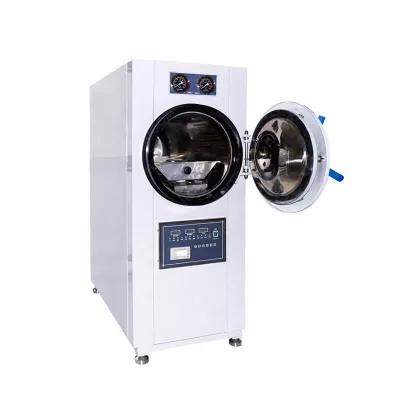What is a horizontal autoclave?
A horizontal autoclave is a type of medical autoclave that is used for sterilization. It is a sealed, pressure–resistant chamber with a door that is heated by steam. It uses steam, pressure, and heat to kill pathogens and other contaminants on instruments, materials, and other items. These autoclaves can have either a gravity or a pre–vacuum cycle to ensure thorough and consistent sterilization of items.
What is the difference between vertical and horizontal autoclave?
A vertical autoclave is cylindrical in shape, taller than it is wide, and designed to accommodate greater amounts of material with its larger internal volume. It provides quick and efficient heat distribution due to its construction.
A horizontal autoclave is generally wider than it is tall, with a flat bottom and a flat top. It is suitable where the loading and unloading of materials requires more space and access, such as beakers and flasks. The top half of a horizontal autoclave can often be opened in two halves, making it easier to load and unload materials.
How does horizontal autoclave principle work?
A horizontal autoclave works by using pressurised steam to create an environment which is free from bacteria and other microorganisms. Steam is injected into the chamber of the autoclave and is heated to a temperature of up to 132°C.
The steam kills bacteria and other organisms through a process of denaturation. The steam also causes the air inside the chamber to expand creating a pressure of up to 15 pounds per square inch (PSI). This elevated pressure forces any water present in the autoclave chamber to evaporate quickly and thereby limiting the amount of contamination that could be present in the load.
After the sterilisation cycle has completed the chamber is vented to reduce the internal pressure which allows the door to be safely opened.
What are the advantages of horizontal autoclave?
1. Easy to use and efficient sterilization – Horizontal autoclaves can sterilize a variety of items such as laboratory instruments, utensils, and tools quickly and effectively, making them much easier to use than other sterilization methods. Depending on the size and model, autoclaves can typically sterilize items in as little as 15 to 20 minutes.
2. Cost-effective – The cost associated with purchasing, installing, and ongoing maintenance of autoclaves is much more cost-effective than other methods of sterilization like chemical disinfectants, which need to be replenished often.
3. Quick turnaround time – Large batches of items can typically be sterilized in a single cycle with a horizontal autoclave, which significantly decreases the time and labor associated with sterilization.
4. Reduced damage – Autoclaving does not cause physical damage to items, as long as instructions for proper autoclaving are followed. This reduces the need for repairing and replacing items due to damage from other types of sterilization.
Add Your Heading Text Here
Technical Parameter | LPWS-150 YDA | LPWS-200 YDA | LPWS-280 YDA | LPWS-400 YDA | LPWS-500YDA |
Sterilizing chamber volume | 150L φ440×1000mm | 200L φ515×1000mm | 280L φ600×1000mm | 400L Φ700×1100mm | 500L Φ700×1300mm |
working pressure | 0.22MPa | ||||
working temperature | 134℃ | ||||
Adjustment of temperature | 105℃ – 134℃ | ||||
Time of sterilization | 0-60 min | ||||
Time of drying | 0-60 min | ||||
Heat average | ≤±2℃ | ||||
Power | 9KW/380V 50Hz | 9KW/380V 50Hz | 12KW/380V 50Hz | 18KW/380V 50Hz | 18KW/380V 50Hz |
Dimension | 1400×600×1300 | 1400×670×1650 | 1400×770×1780 | 1430×880×1830 | 1800×900×1820 |
Transport dimension | 1550×750×1850 | 1560×820×1850 | 1680×920×2100 | 1600×1050×2100 | 1850×1050×2100 |
G.W/N.W | 320/240 KG | 350/260 KG | 465/365 KG | 530/420 KG | 580/470 KG |

LPWS-YDB Horizontal Autoclave Sterilizer
Horizontal Autoclave Sterilizer Application Horizontal autoclave sterilizers are often used in healthcare facilities, laboratories, and in other applications that require sterilizating tools, instruments, and materials.
LPTM-XD Benchtop Autoclave Sterilizer
What is benchtop autoclave? Benchtop autoclave sterilizers are small appliances used to sterilize medical instruments and other materials. They use steam under pressure to kill
LPTM-XB Benchtop Autoclave Sterilizer
Benchtop Autoclave Sterilizer Application A benchtop autoclave sterilizer is most commonly used to sterilize medical instruments, tools and other items used in the healthcare industry.